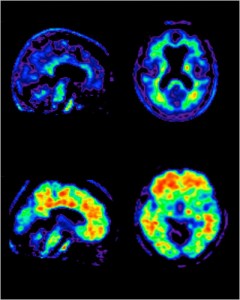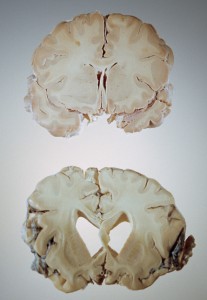
Image credit: iStock
Parents who are both present and engaged are the very best way of preventing teenagers from consuming large quantities of alcohol. Adolescents who smoke, stay out with their friends and have access to alcohol – from their parents, for example – when they are as young as 13 are at greater risk of becoming binge drinkers in their late teens, reveals a new thesis from Karolinska Institutet in Sweden.
“Initiatives that focus on strengthening the parent-child relationship and limiting parental provision of alcohol can prove effective in limiting risky consumption among adolescents,” says Anna-Karin Danielsson from the Department of Public Health Sciences. “Parents also play an important role when it comes to teaching young people how to resist peer pressure to drink.”
[continue reading…]

Top, images from the brain of a cognitively normal volunteer; bottom, results from an Alzheimer's patient. Plaque buildup is shown in red.
computer program that uses brain scans to spot Alzheimer’s Disease early is being tested by the NHS.
The new method compares the patient’s brain to a database of 1,200 existing images of brains known to be affected by the degenerative brain condition.
This collection of images is thought to be the largest of its kind in the world.
The test, which was developed at Maudsley Hospital and Kings College London, delivers results that are 85 per cent accurate in just 24 hours.
Curious? Continue reading
Source: The Daily Mail
Researchers rethink the role of amyloid in causing Alzheimer’

Differences in a healthy brain (top) and a diseased one (bottom) clearly show the damage wrought by Alzheimer’s. Credit: © Maggie Steber/National Geographic Society, Corbis
The polite term for what Alzheimer’s disease does to the brain is “neurodegeneration.”
In reality, it’s more like violent, indiscriminate devastation. Alzheimer’s scrambles communication channels, incites massive inflammation and demolishes entire brain regions as once plump cells shrivel and die, burying memories in the wreckage. As the attack intensifies, Alzheimer’s gradually strips away a person’s mind, and ultimately the cognitive abilities that permit a conversation with a loved one, a smile or a taste of food.
A couple of decades ago, some researchers thought they knew the root cause of this brain invasion?—?dangerous buildups of a protein called amyloid-beta. Get rid of these big, sticky globs and cure the disease, the reasoning went. But in recent years, a deeper understanding of the disease, along with a few disappointing clinical trials, has challenged long-held assumptions and forced a reevaluation of this strategy. [continue reading…]
Historically, men have been more likely to cheat, but cybersex may be changing that, research suggests.

© iStockphoto
The typical affair used to start in the office and move to a seedy motel room, but the vast reach of the Internet has brought infidelity into many couples’ homes over the past decade.
The growth in steamy chat room conversations and cybersex also has triggered a rethinking of the meaning of infidelity. If there is no physical contact or actual sex, is it still an affair?
“It’s not just that you’re communicating with someone online but that there is a sexual or emotional nature,” says Katherine Hertlein, PhD, an associate professor at the University of Nevada in Las Vegas who studies online affairs. “With the Internet, we’re moving away from just physical ideas about infidelity and acknowledging emotional infidelity.”
While there is no universally accepted definition, an Internet affair frequently involves intimate chat sessions and sexually stimulating conversation or cybersex, which may include filming mutual masturbation with a Web camera.
Several studies suggest that even when there is no in-person contact, online affairs can be just as devastating as the real-world variety, triggering feelings of insecurity, anger and jealousy. Women usually feel more threatened by the emotional betrayal of a partner’s online affair, while men are more concerned about physical encounters, Hertlein says, but the gender differences are lessening. Curious? Continue reading
Source: American Psychological Association




